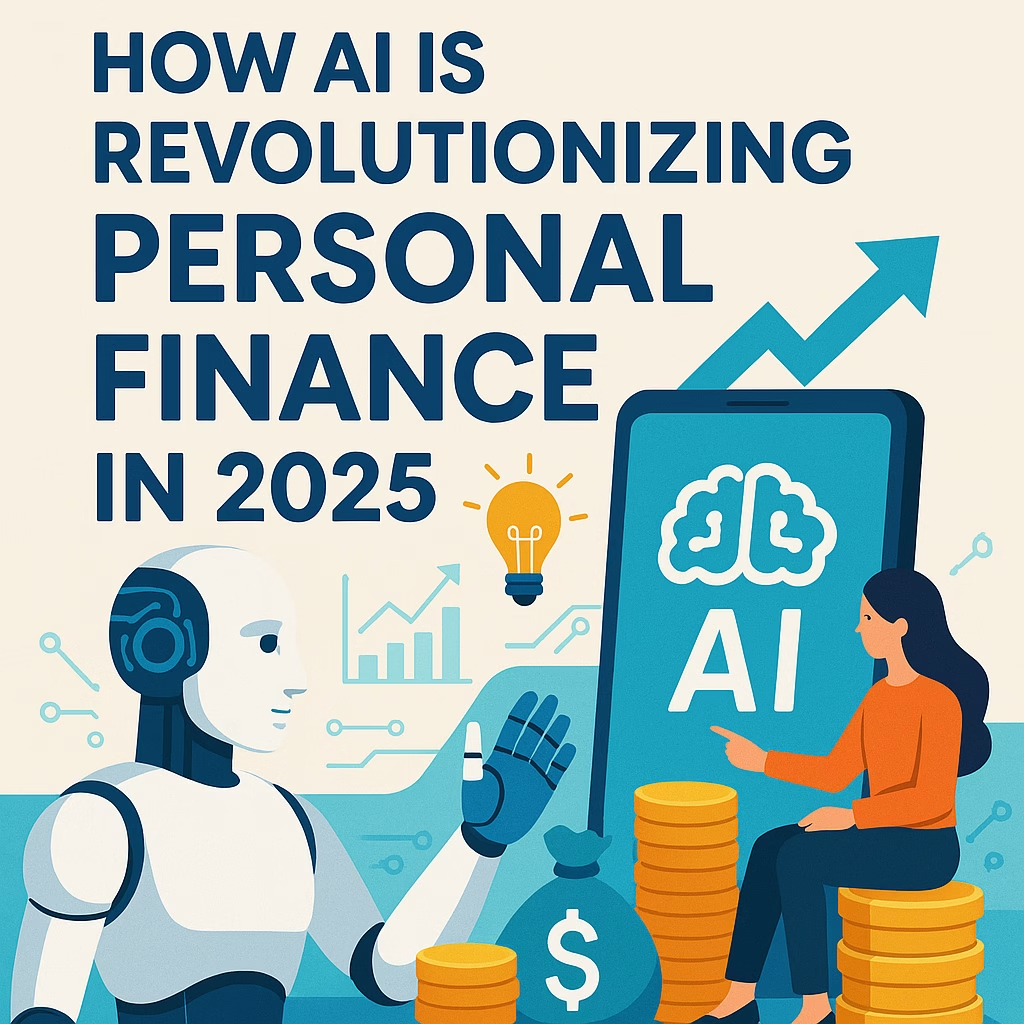💥 Introduction: Your Money’s New Best Friend
Imagine having a financial advisor in your pocket — one that never sleeps, adapts to your spending habits, and helps you make smarter money moves. In 2025, Artificial Intelligence (AI) is doing just that. From personalized budgeting to AI-driven investment strategies, the financial world is being redefined — and it’s happening fast.
This article dives deep into how AI is revolutionizing personal finance in 2025, exploring the tools, trends, and technologies that are making our financial lives smarter, safer, and more efficient.

🔍 What Is AI in Personal Finance?
Artificial Intelligence in personal finance refers to algorithms and machine learning models that analyze data, predict outcomes, and make decisions or recommendations based on your financial behavior.
Common Uses of AI in Personal Finance:
- Budget tracking and spending insights
- Robo-advisors for investments
- Fraud detection and security
- Credit scoring and loan approvals
- Smart savings and debt repayment strategies
🧠 Top Ways AI is Transforming Personal Finance in 2025
1. Hyper-Personalized Budgeting Tools
AI budgeting apps like Cleo, Monarch, and YNAB now do more than just track expenses — they predict them. Based on your historical behavior, these apps:
- Suggest spending limits
- Warn about upcoming bills
- Recommend ways to save
💡 Example: Cleo uses AI-powered chat to analyze your spending and roast you (in a funny way) to keep you financially accountable.
2. AI-Powered Investment Platforms
Robo-advisors like Betterment, Wealthfront, and newer AI-enhanced platforms now:
- Automatically rebalance portfolios
- Adjust risk levels based on economic conditions
- Use predictive analytics to spot trends
🧠 AI in action: Some platforms use sentiment analysis from news and social media to guide investment decisions.
3. Smarter Credit Decisions
AI now helps lenders:
- Evaluate borrowers using alternative data (like utility payments or social behavior)
- Reduce human bias in credit scoring
- Approve loans faster with lower risk
According to Forbes, AI has reduced loan default rates by 20-30% in some fintech platforms by improving risk prediction models. (source)
4. AI Chatbots as Financial Coaches
AI chatbots like Erica by Bank of America or Eno by Capital One now act like financial coaches:
- Send reminders about due payments
- Alert users of unusual spending
- Offer actionable financial tips
5. Enhanced Fraud Detection and Security
AI systems continuously monitor for:
- Unusual spending patterns
- Login anomalies
- Location-based fraud risks
🔐 Stat: The global fraud detection & prevention market is expected to hit $63 billion by 2027, largely driven by AI tech.
🔗 Real-World Examples of AI in Action
📱 AI-Driven Apps Gaining Popularity:
- Plum: Uses AI to automate savings based on daily spending
- Trim: Negotiates bills and finds unused subscriptions
- Albert: Provides human + AI financial advice in one app
👥 According to The Guardian:
“AI tools are empowering users to become their own financial advisors — with faster decision-making, real-time insights, and fewer financial blind spots.” (source)
📊 Is AI Always Right? Challenges to Consider
While AI brings amazing advancements, it’s not without issues:
- Bias in algorithms (especially in lending)
- Over-reliance on automation
- Data privacy concerns
The key is balance — using AI to enhance financial decisions, not replace human judgment entirely.
✅ Key Takeaways
- AI is changing how we budget, invest, borrow, and save.
- Tools powered by AI are becoming more accessible and user-friendly.
- With the right use, AI can significantly improve financial literacy and money management.
💬 What’s Next?
AI in finance is just getting started. As tools get smarter and more intuitive, managing money could become less stressful and more empowering. Are you ready to let AI help you with your finances?
👉 Let us know in the comments: What’s your favorite AI finance tool — or one you’d like to try?




